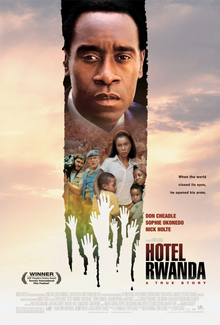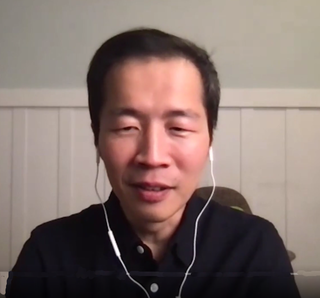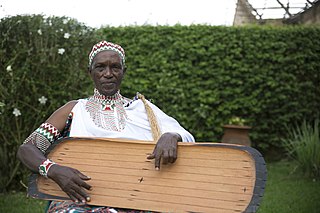Contents
This is a list of museums in Rwanda.
This is a list of museums in Rwanda.

Rwanda, officially the Republic of Rwanda, is a landlocked country in the Great Rift Valley of Central Africa, where the African Great Lakes region and Southeast Africa converge. Located a few degrees south of the Equator, Rwanda is bordered by Uganda, Tanzania, Burundi, and the Democratic Republic of the Congo. It is highly elevated, giving it the soubriquet "land of a thousand hills", with its geography dominated by mountains in the west and savanna to the southeast, with numerous lakes throughout the country. The climate is temperate to subtropical, with two rainy seasons and two dry seasons each year. It is the most densely populated mainland African country; among countries larger than 10,000 km2, it is the fifth-most densely populated country in the world. Its capital and largest city is Kigali.

Kigali is the capital and largest city of Rwanda. It is near the nation's geographic centre in a region of rolling hills, with a series of valleys and ridges joined by steep slopes. As a primate city, Kigali is a relatively new city. It has been Rwanda's economic, cultural, and transport hub since it was founded as an administrative outpost in 1907, and became the capital of the country at independence in 1962, shifting focus away from Huye.

Paul Kagame is a Rwandan politician and former military officer who has been the President of Rwanda since 2000. He was previously a commander of the Rwandan Patriotic Front (RPF), a rebel armed force which invaded Rwanda in 1990. The RPF was one of the parties of the conflict during the Rwandan Civil War and the armed force which ended the Rwandan genocide. He was considered Rwanda's de facto leader when he was Vice President and Minister of Defence under President Pasteur Bizimungu from 1994 to 2000 after which the vice-presidential post was abolished.

The Rwandan genocide, also known as the genocide against the Tutsi, occurred between 7 April and 19 July 1994 during the Rwandan Civil War. During this period of around 100 days, members of the Tutsi minority ethnic group, as well as some moderate Hutu and Twa, were killed by armed Hutu militias. Although the Constitution of Rwanda states that more than 1 million people perished in the genocide, the actual number of fatalities is unclear, and some estimates suggest that the real number killed was likely lower. The most widely accepted scholarly estimates are around 500,000 to 800,000 Tutsi deaths.

Hotel Rwanda is a 2004 docudrama film co-written and directed by Terry George. It was adapted from a screenplay by George and Keir Pearson, and stars Don Cheadle and Sophie Okonedo as hotelier Paul Rusesabagina and his wife Tatiana. Based on the genocide against the Tutsi in Rwanda, which occurred during the spring of 1994, the film documents Rusesabagina's efforts to save the lives of his family and more than 1,000 other refugees by providing them with shelter in the besieged Hôtel des Mille Collines. Hotel Rwanda explores genocide, political corruption, and the repercussions of violence.

The Rwanda national football team represents Rwanda in international football and is controlled by the Rwandese Association Football Federation, the governing body of football in Rwanda, and competes as a member of the Confederation of African Football (CAF), as well as the Council for East and Central Africa Football Associations (CECAFA), a CAF sub-confederation that governs football in East and Central Africa. The team bears the nickname Amavubi, and primarily plays its home games at the Stade Amahoro in Kigali, the nation's capital. They have never qualified for a World Cup finals, and reached their only Africa Cup of Nations in 2004.

Nyanza, also known as Nyabisindu, is a town located in Nyanza District in the Southern Province of Rwanda. Nyanza is the capital of the Southern Province.

The Prime Minister of Rwanda is the head of government of the Republic of Rwanda. The prime minister is appointed by the president, along with other ministers in the Cabinet. A total of 11 people have served in the office. The incumbent prime minister is Édouard Ngirente, who took office on 30 August 2017.

Butare, also known as Huye and formerly known as Astrida, is a city with a population of 75,000 in the Southern Province of Rwanda and the capital of Huye district. It is the fifth largest town in Rwanda by population.
Tourism in Rwanda is the largest source of foreign exchange earnings in Rwanda. It was projected to grow at a rate of 25% every year from 2013-2018. The sector is the biggest contributor to the national export strategy. Total revenue generated from the sector in 2014 alone was USD 305 million.

Mukura Victory Sports et Loisirs Football Club, commonly known as Mukura Victory Sports or simply Mukura, is an association football club from Butare, Rwanda. Founded in May 1963, the club currently competes in the Rwanda Premier League and plays its home games at Stade Huye.

The wildlife of Rwanda comprising its flora and fauna, in prehistoric times, consisted of montane forest in one third the territory of present-day Rwanda. However, natural vegetation is now mostly restricted to the three national parks and four small forest reserves, with terraced agriculture dominating the rest of the country.
The National Library of Rwanda known as "Inkoranyabitabo y'Igihugu" in Kinyarwanda, was founded in 1989 by the presidential order no 132/06 of March the 10th 1989 as a direction in Ministry of High Education and Research. It is located in the city of Kigali. It has a printed and digital collections. The Rwanda Archives and Library Services Authority was established by the Law No 12/2014 of 09/05/2014.

Lee Isaac Chung is an American filmmaker. His debut feature Munyurangabo (2007) was an official selection at the 2007 Cannes Film Festival and the first narrative feature film in the Kinyarwanda language.

The Cape Town Holocaust & Genocide Centre began as Africa's first Holocaust centre founded in 1999. It has sister Centres in Johannesburg and Durban, and together they form part of the association, the South African Holocaust & Genocide Foundation (SAHGF). The SAHGF determines the educational and philosophical direction of the centre. It also conducts teacher training and is the only accredited service-provider for in-service training in Holocaust education in the country. It has trained over 5,000 teachers.
The Ruzagayura famine was a major famine which occurred in the Belgian mandate of Ruanda-Urundi during World War II. It led to numerous deaths and a huge population migration out of the territory and into the neighboring Belgian Congo and surrounding areas. The famine is considered to have begun in October 1943 and ended in December 1944.
The International Council of Museums defines a museum as "a not-for-profit, permanent institution in the service of society that researches, collects, conserves, interprets and exhibits tangible and intangible heritage. Open to the public, accessible and inclusive, museums foster diversity and sustainability. They operate and communicate ethically, professionally and with the participation of communities, offering varied experiences for education, enjoyment, reflection and knowledge sharing.”

Trough zithers are a group of African stringed instruments or chordophones whose members resemble wooden bowls, pans, platters, or shallow gutters with strings stretched across the opening. A type of zither, the instruments may be quiet, depending upon the shape of the bowl or string-holder. Sound is often amplified with the addition of a gourd resonator. Instruments have been classed into five different types, based on shape.

Predictions of a genocide in Ethiopia, particularly one that targets Tigrayans, Amharas and/or Oromos, have frequently occurred during the 2020s, particularly in the context of the Tigray War and Ethiopia's broader civil conflict.